-
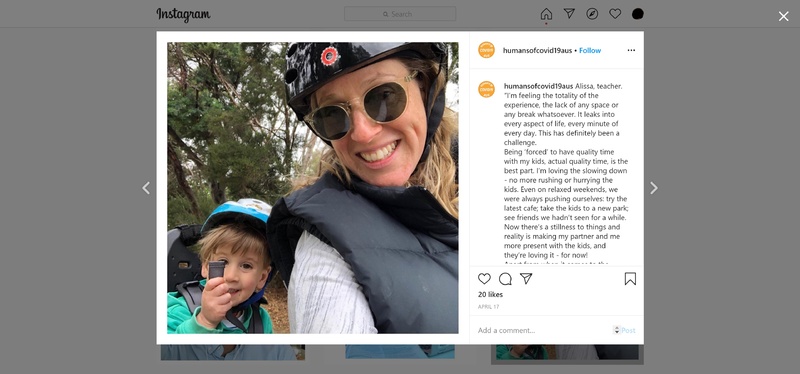
2020-04-17
“I’m feeling the totality of the experience, the lack of any space or any break whatsoever. It leaks into every aspect of life, every minute of every day. This has definitely been a challenge.
Being ‘forced’ to have quality time with my kids, actual quality time, is the best part. I’m loving the slowing down - no more rushing or hurrying the kids. Even on relaxed weekends, we were always pushing ourselves: try the latest cafe; take the kids to a new park; see friends we hadn’t seen for a while. Now there’s a stillness to things and reality is making my partner and me more present with the kids, and they’re loving it - for now!
Apart from when it comes to the phone… that’s almost become a source of evil, with too much going on. I’m trying to put it aside when I can.”
Instagram post on Alissa, a teacher, and her experience during the pandemic, which was created by a psychology student living in Melbourne who was interested to hear about how COVID-19 was impacting on different peoples’ lives.
-
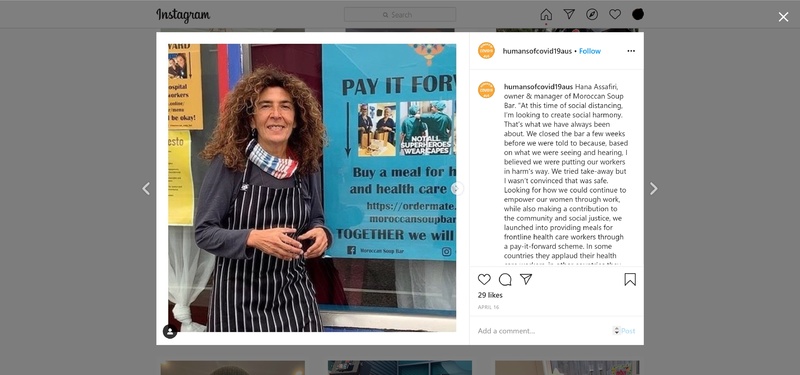
2020-04-16
“At this time of social distancing, I’m looking to create social harmony. That’s what we have always been about. We closed the bar a few weeks before we were told to because, based on what we were seeing and hearing, I believed we were putting our workers in harm’s way. We tried take-away but I wasn’t convinced that was safe.
Looking for how we could continue to empower our women through work, while also making a contribution to the community and social justice, we launched into providing meals for frontline health care workers through a pay-it-forward scheme. In some countries they applaud their health care workers, in other countries they sing for them. In Melbourne, it’s all about the food, so it makes sense we feed them!
Everything is cause and effect. This pandemic didn’t just ‘happen’, nor was it dropped on us by aliens. It is a consequence of how we live in the world, our disregard for animals and the environment. We must take heed of what got us here and change the conversation, rather than just thinking we are going to ‘snap back’. Our behaviours and attachments came to an abrupt halt. I’m already seeing a change in attitudes. It’s about harnessing this and taking this opportunity to reset our values and activate our citizenship to work towards a more harmonious society. Almost all of those doing the thinking and leading are men. Women know how to heal with heart and compassion. We need to respect that contribution, not take it for granted.”
Instagram post on Hanna, owner & manager of Moroccan Soup Bar, and her experience during the pandemic, which was created by a psychology student living in Melbourne who was interested to hear about how COVID-19 was impacting on different peoples’ lives.
-
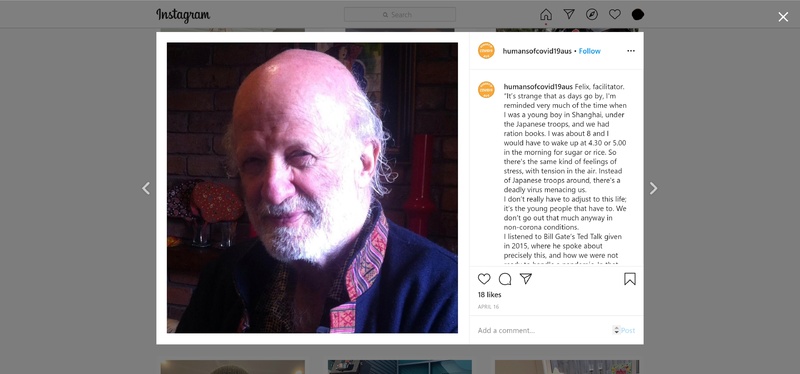
2020-04-16
“It’s strange that as days go by, I'm reminded very much of the time when I was a young boy in Shanghai, under the Japanese troops, and we had ration books. I was about 8 and I would have to wake up at 4.30 or 5.00 in the morning for sugar or rice. So there's the same kind of feelings of stress, with tension in the air. Instead of Japanese troops around, there's a deadly virus menacing us.
I don’t really have to adjust to this life; it’s the young people that have to. We don’t go out that much anyway in non-corona conditions.
I listened to Bill Gate’s Ted Talk given in 2015, where he spoke about precisely this, and how we were not ready to handle a pandemic. In that sense, some knowledgeable people could have predicted this.
In terms of immensity, this is probably one of the biggest possible events imaginable.”
Instagram post on Felix, a facilitator, and his experience during the pandemic, which was created by a psychology student living in Melbourne who was interested to hear about how COVID-19 was impacting on different peoples’ lives.
-
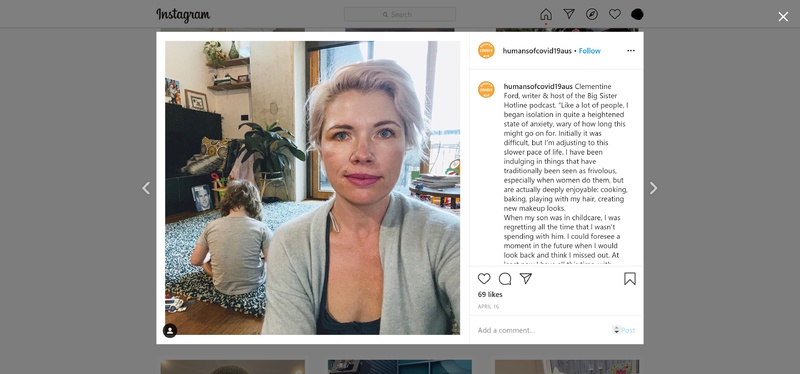
2020-04-16
“Like a lot of people, I began isolation in quite a heightened state of anxiety, wary of how long this might go on for. Initially it was difficult, but I’m adjusting to this slower pace of life. I have been indulging in things that have traditionally been seen as frivolous, especially when women do them, but are actually deeply enjoyable: cooking, baking, playing with my hair, creating new makeup looks.
When my son was in childcare, I was regretting all the time that I wasn’t spending with him. I could foresee a moment in the future when I would look back and think I missed out. At least now I have all this time, with memories I otherwise wouldn't have had.
Women are on the front line at the moment: nurses, health care workers, child care workers, teachers. Interestingly, this has really exposed exactly who the essential workers are in our society. They’re not the CEOS, but the women out there who are taking care of their communities.
What has become transparently obvious from this pandemic is that the only thing holding us back from significant social change is political and social will power. We are highly malleable and adaptable as a species. We have the choice to build the kind of society that we want to live in. It's just about whether we want to do it.”
Instagram post on Clementine Ford, writer & host of the Big Sister Hotline podcast, and her experience during the pandemic, which was created by a psychology student living in Melbourne who was interested to hear about how COVID-19 was impacting on different peoples’ lives.
-
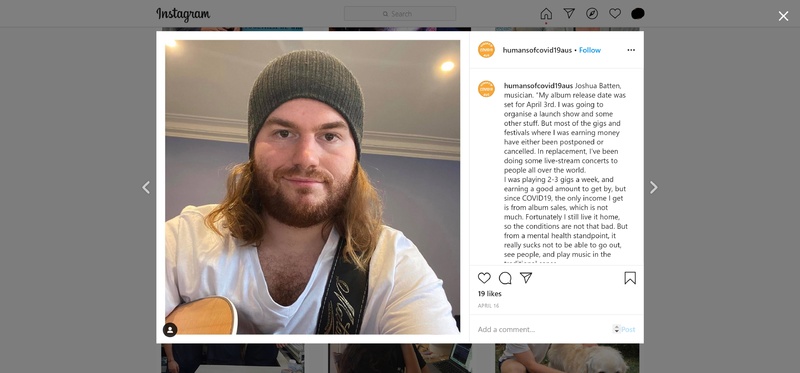
2020-04-16
“My album release date was set for April 3rd. I was going to organise a launch show and some other stuff. But most of the gigs and festivals where I was earning money have either been postponed or cancelled. In replacement, I’ve been doing some live-stream concerts to people all over the world.
I was playing 2-3 gigs a week, and earning a good amount to get by, but since COVID19, the only income I get is from album sales, which is not much. Fortunately I still live it home, so the conditions are not that bad. But from a mental health standpoint, it really sucks not to be able to go out, see people, and play music in the traditional sense.
We’ve been looking for other options, but I have really had to change course. For many artists, it is incredibly stressful. The government hasn’t offered nearly enough support in our sector. Musicians are also parents, music is their main source of income. And it’s not just the musicians; it’s the behind-the-scenes people too. It’s not a sign of weakness to ask for help.
In order to support artists at this time, people can check out the website ‘I lost my gig’, Tipjar or schedule in time just to listen to new music. I think the arts industry will be one of the last things to get back on its feet.”
Instagram post on Joshua Batten, musician, and his experience during the pandemic, which was created by a psychology student living in Melbourne who was interested to hear about how COVID-19 was impacting on different peoples’ lives.
-

2020-04-16
“Broadcasting is classified as an essential service, so we still have to work as much, if not more, as before. COVID has changed the entire way we approach stories; in particular, we can’t be close to someone when we interview them. Without being able to shake hands, the interactions can be quite awkward.
At first, I think people were struggling. The bushfires were all about a team effort, and that was so fundamental to getting everyone through. But with corona hitting, and the toilet paper saga, it was each man for themselves. This was a big blow to a lot of people.
There have been some really somber days, with huge numbers of people losing their jobs overnight. We all felt it. A reminder of our sympathetic, compassionate nature as Australians.”
Instagram post on Jesse Burns, journalist, and his experience during the pandemic, which was created by a psychology student living in Melbourne who was interested to hear about how COVID-19 was impacting on different peoples’ lives.
-
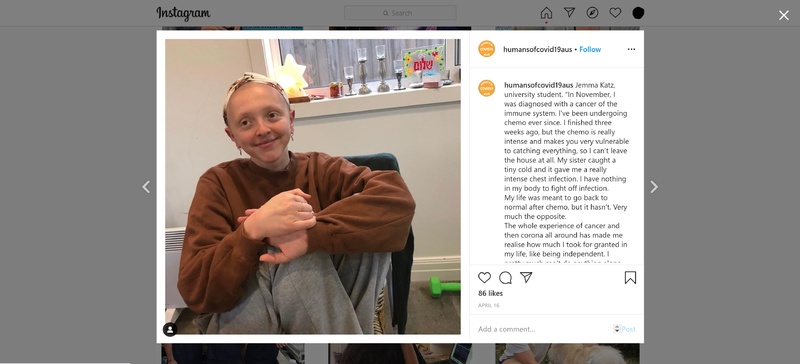
2020-04-16
“In November, I was diagnosed with a cancer of the immune system. I've been undergoing chemo ever since. I finished three weeks ago, but the chemo is really intense and makes you very vulnerable to catching everything, so I can’t leave the house at all. My sister caught a tiny cold and it gave me a really intense chest infection. I have nothing in my body to fight off infection.
My life was meant to go back to normal after chemo, but it hasn’t. Very much the opposite.
The whole experience of cancer and then corona all around has made me realise how much I took for granted in my life, like being independent. I pretty much can’t do anything alone. I'm 23, and not really living the life of a 23 year old.
I've found it helpful to establish a routine. I’m looking forward to being able to do the simple things once this is over, like going for a drive or a walk alone, being able to look after myself.”
Instagram post on Jemma, a university student, and her experience during the pandemic, which was created by a psychology student living in Melbourne who was interested to hear about how COVID-19 was impacting on different peoples’ lives.
-
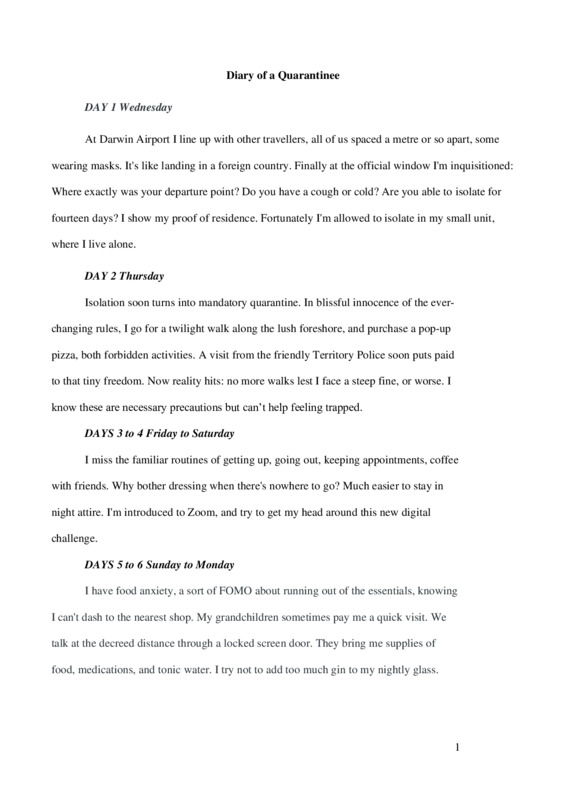
0020-06-01T07:00:00
I was ordered into enforced quarantine on arriving in the NT on 25 March 2020. It felt somewhat like being in a police state, especially when two burly police officers came to my place of quarantine to check on me. After railing against my 14 day imprisonment, I gradually saw some advantages in isolation, and finally wanted to stay in quarantine forever! #Covid19
-
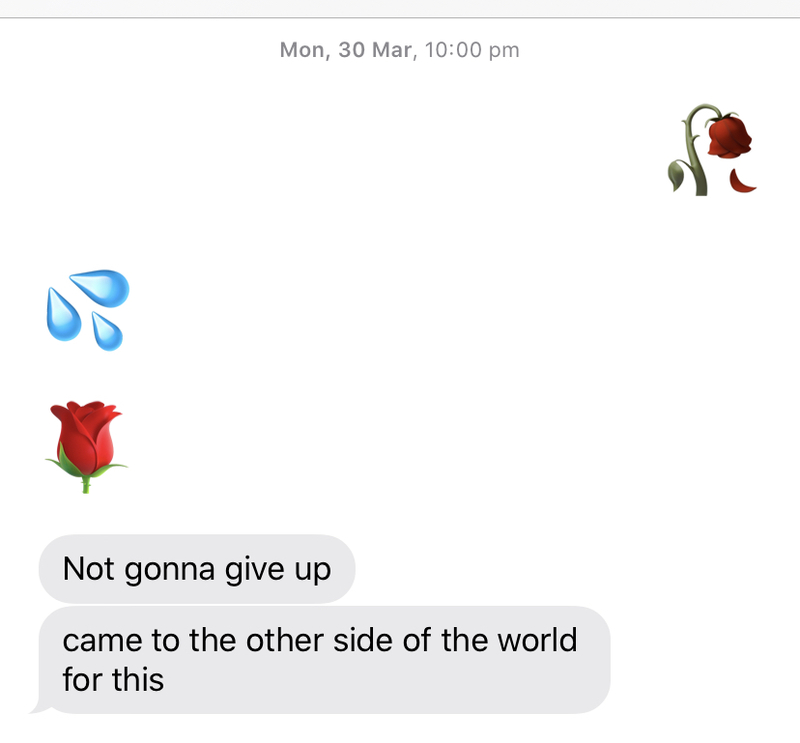
2020-06-19
I was only a month into dating a British guy here in Australia on a working holiday visa when the pandemic started affecting countries outside of China. The battle that China was facing at the time seemed far, far away, as if it could never reach us all the way here in Australia. For a lot of young people like myself, we continued our daily lives, a little anxious, alert but otherwise content with our circumstances. So far, we were free. At university, a friend once proclaimed, ‘it’s okay, even if we were to get it, for young people, it’s just like the common cold, which is another form of coronavirus anyway.’ Things progressed extremely fast of course. From announcement of the first identified case in Australia, it was a matter of people frantically tuning in to the news every single day and night, talking with neighbours and phoning relatives overseas as we eagerly awaited the next steps of prime minister Scott Morrison. At first, Australia was hesitant to respond, with Morrison and health officials calmly addressing the nation on news. But surely, as the number of cases in Australia grew from 1 to 30 to 150 by March 19, the borders shut, shops closed and we became housebound. Stage 1 restrictions had begun. It’s hard to believe that since then, I’ve completed an entire semester, 9 weeks of university, online.
Just a few days before these restrictions began on March 19-20, my boyfriend and I, having only been dating 1 month, went through a rough patch causing me to break off the relationship. Then, once lockdown began, his workplace closed and he realised he had insufficient savings to last more than a month of rent and expenses in Melbourne. Being a UK citizen, he was also not entitled to the stream of government financial benefits that had recently initiated. He didn’t even have Medicare so if he were to suddenly fall ill, he wouldn't be able to afford basic medical care. After pouring his heart out to me about all this, I knew that the best thing for him was to fly back to the UK. In my mind, we were over and there was no reason for him to stay and suffer in Australia. However, stubbornly and against my advice, he insisted on staying if I gave him another chance because he wanted to resolve our issues and continue the relationship. He wanted to show me that he’s not the type of guy to leave when things get tough (bit dramatic, yes). He also knew that if he left, he wouldn’t be able to return to Australia, because of his type of visa. For him, there was literally no advantage in staying: no work, no savings, no family. All he had was me, and the prospect of our relationship. For whatever reason, he decided that that was worth fighting for, amid a global pandemic and financial hardship.
After many long conversations back and forth, he convinced me that it was indeed possible for him to stay because he was willing to do whatever it took, even borrowing money from family, an idea that normally revolts him. Meanwhile, I realised I didn't want to give up on our relationship. I wanted him beside me, especially during this uncertainty. I knew that a guy willing to stay in a country for you, is a guy you only meet once in a lifetime. So, I gave him another chance and we fought to get through.
For 2 months, this is what our lives looked like:
- Him, cooped up in his apartment with his flatmates, playing videogames, applying for jobs here and there, checking for updates and praying that the government would offer any help to temporary visa holders
- Me, cooped up in my suburban home, watching online lectures, bonding with my family, exercising, baking
- Me, buying him food and groceries when I could
- Us, Facetiming, every night, making each other laugh, planning all the things we’d do when restrictions lifted and addressing uncomfortable topics with a pandemic sense of urgency
- Us, meeting up twice a week, spending the entire day together just driving around in my car, taking away food and coffee, feeding off each other’s presence in this lonely time
- Us, without the hussle and bustle of ‘normal’ life, getting to know each other deeply and authentically. You can’t hide behind your work mask or your social mask during lockdown.
Where we are now, 4 months later. We are going strong. Our issues are past us, and he has been nothing but amazing and supportive. He managed to find work again and received a rent grant. Financially, he has survived. Restrictions in Australia have lifted, restaurants are open for dine-in, sports matches are re-opening and groups of up to 20 can now gather in a home. Things are finally looking up. He is hoping to find farm work soon, which everyone on a working holiday visa must do in order to stay a second year.
This whole experience has been surreal. This isn’t the first time the world has witnessed a pandemic but it’s certainly the first time entire countries have gone into lockdown. At the age of 22, I never thought my relationship would develop alongside a pandemic. I’m so grateful I’ve had someone to share this experience with. More importantly, I’ve learned that when an amazing thing or person comes into your life, to hold on and fight for it because at the end of the day, all we have is our health, and our love for people.
-
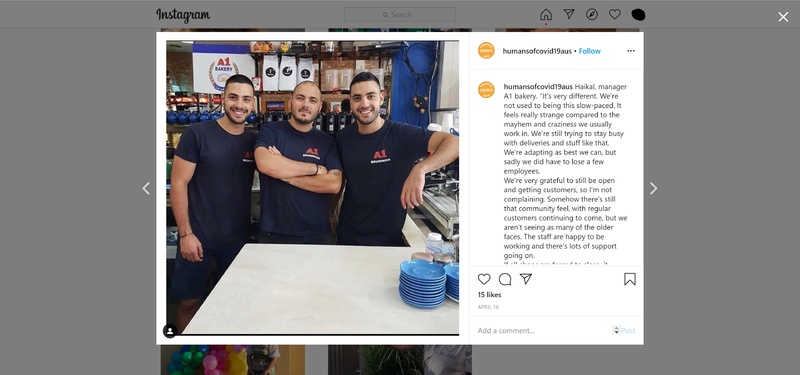
2020-04-16
“It’s very different. We’re not used to being this slow-paced. It feels really strange compared to the mayhem and craziness we usually work in. We’re still trying to stay busy with deliveries and stuff like that. We’re adapting as best we can, but sadly we did have to lose a few employees.
We’re very grateful to still be open and getting customers, so I’m not complaining. Somehow there’s still that community feel, with regular customers continuing to come, but we aren’t seeing as many of the older faces. The staff are happy to be working and there’s lots of support going on.
If all shops are forced to close, it would affect our family heaps - it's what we do. We’ve been doing it since 1992.”
Instagram post on Haikal,, manager A1 bakery, and their experience during the pandemic, which was created by a psychology student living in Melbourne who was interested to hear about how COVID-19 was impacting on different peoples’ lives.
-
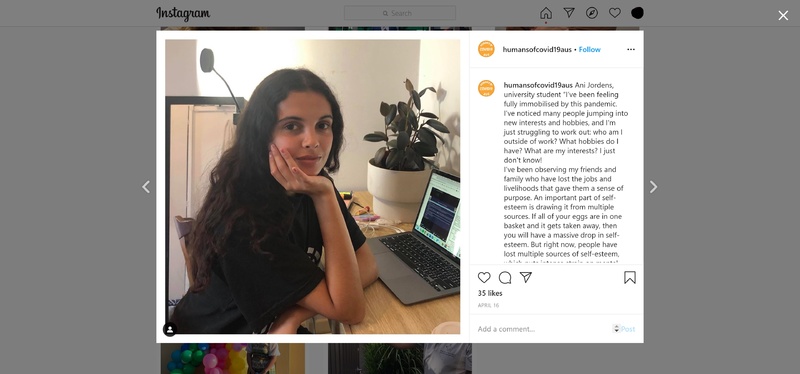
2020-04-16
“I’ve been feeling fully immobilized by this pandemic. I’ve noticed many people jumping into new interests and hobbies, and I'm just struggling to work out: who am I outside of work? What hobbies do I have? What are my interests? I just don't know!
I’ve been observing my friends and family who have lost the jobs and livelihoods that gave them a sense of purpose. An important part of self-esteem is drawing it from multiple sources. If all of your eggs are in one basket and it gets taken away, then you will have a massive drop in self-esteem. But right now, people have lost multiple sources of self-esteem, which puts intense strain on mental health.
Perhaps we need new structures and more supportive systems. The working-at-home thing has revolutionized able-bodied peoples’ lives, and could be used in a really productive way post-pandemic to make careers more accessible to people with a disability. Hopefully we learn something from this.”
Instagram post on Ani Jordens, a university student, and her experience during the pandemic, which was created by a psychology student living in Melbourne who was interested to hear about how COVID-19 was impacting on different peoples’ lives.
-
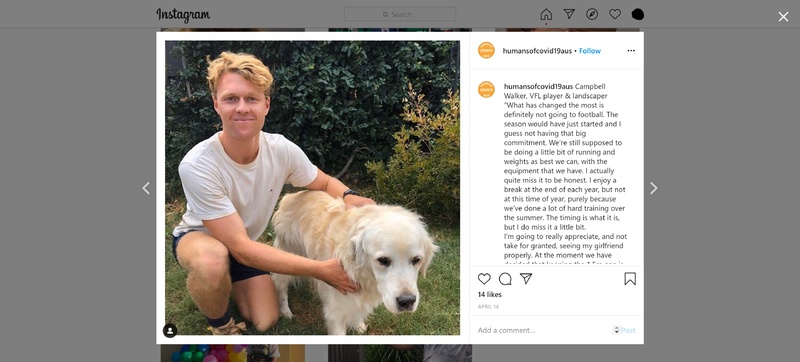
2020-04-16
“What has changed the most is definitely not going to football. The season would have just started and I guess not having that big commitment. We’re still supposed to be doing a little bit of running and weights as best we can, with the equipment that we have. I actually quite miss it to be honest. I enjoy a break at the end of each year, but not at this time of year, purely because we’ve done a lot of hard training over the summer. The timing is what it is, but I do miss it a little bit.
I'm going to really appreciate, and not take for granted, seeing my girlfriend properly. At the moment we have decided that keeping the 1.5m gap is the best decision for us. Like we’re still going for a few walks and that, but in terms of actually giving her a big hug when I see her. It’s only been a couple of weeks since we’ve decided to do that, but it’s still pretty rough. I wont take that for granted, and I’ll definitely appreciate that, when the restrictions lift and we’re able to do that again.”
Instagram post on Campbell Walker, VFL player & landscaper, and his experience during the pandemic, which was created by a psychology student living in Melbourne who was interested to hear about how COVID-19 was impacting on different peoples’ lives.
-
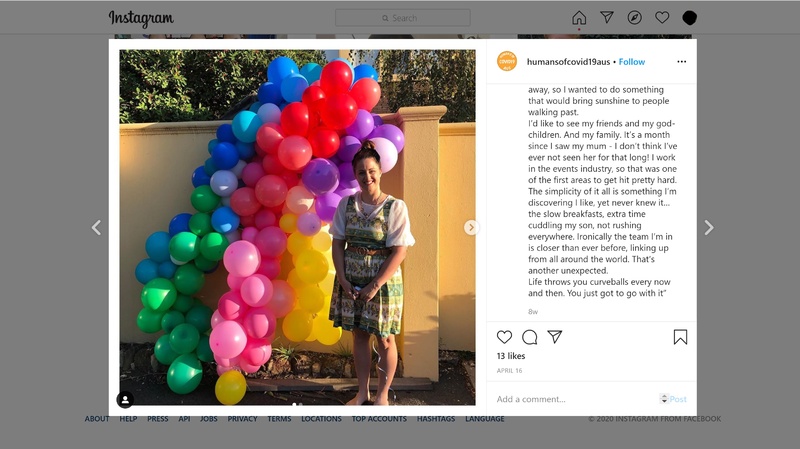
2020-04-16
“Like everyone else, I was feeling a bit gloomy and today is actually the anniversary of my brother passing away, so I wanted to do something that would bring sunshine to people walking past.
I’d like to see my friends and my god-children. And my family. It’s a month since I saw my mum - I don’t think I’ve ever not seen her for that long! I work in the events industry, so that was one of the first areas to get hit pretty hard.
The simplicity of it all is something I’m discovering I like, yet never knew it… the slow breakfasts, extra time cuddling my son, not rushing everywhere. Ironically the team I’m in is closer than ever before, linking up from all around the world. That’s another unexpected.
Life throws you curveballs every now and then. You just got to go with it”
Instagram post on Nicole, events, and her experience during the pandemic, which was created by a psychology student living in Melbourne who was interested to hear about how COVID-19 was impacting on different peoples’ lives.
-
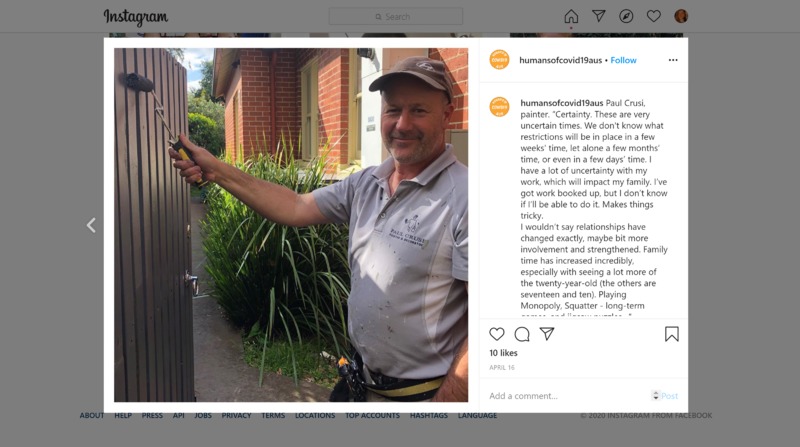
2020-04-16
“Certainty. These are very uncertain times. We don't know what restrictions will be in place in a few weeks' time, let alone a few months’ time, or even in a few days’ time. I have a lot of uncertainty with my work, which will impact my family. I’ve got work booked up, but I don’t know if I’ll be able to do it. Makes things tricky.
I wouldn’t say relationships have changed exactly, maybe bit more involvement and strengthened. Family time has increased incredibly, especially with seeing a lot more of the twenty-year-old (the others are seventeen and ten). Playing Monopoly, Squatter - long-term games, and jigsaw puzzles…”
Instagram post on Paul Crusi, a painter, created by a psychology student living in Melbourne who was interested to hear about how COVID-19 was impacting on different peoples’ lives.
-
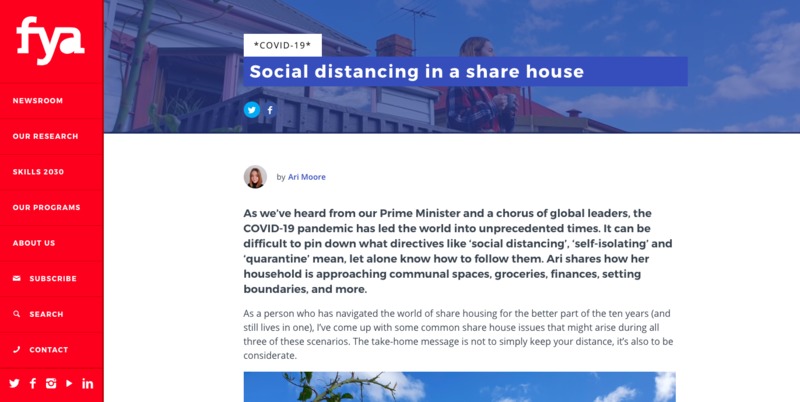
2020-03-23
'Social Distancing in a Share House' is an article I wrote for The Foundation for Young Australians about how to minimise the risk of contagion while living in a shared house and be thoughtful about sharing space with others during these stressful times. The article followed discussions with my housemates where we were unclear on how to keep everyone safe while maintaining autonomy and/or continuing with essential work.
-
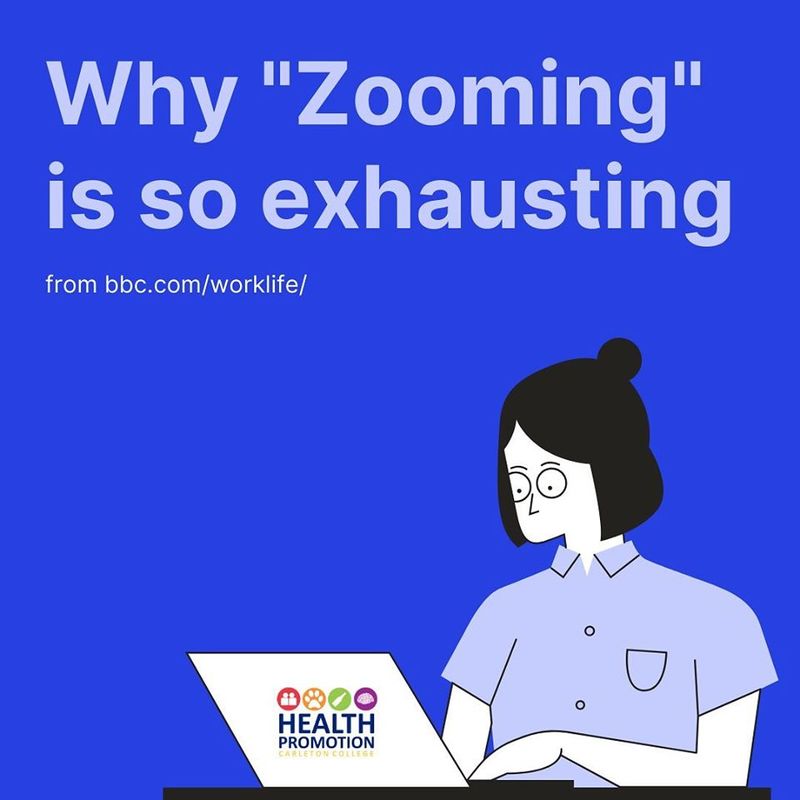
2020-05
With the pandemic came online learning and being forced into a class room situation where everything was mediated through our screens. I found this learning style to be mentally draining and had felt that I was alone in my experience when all I saw online was people celebrating the wonders of connecting through zoom. Seeing this infographic which acknowledges zoom exhaustion and breaks down why it happens and ways to overcome it was really nice. It shows that my experience is felt by many and while technology has allowed many of us to stay connected it isn't with negatives.
HUM402
-
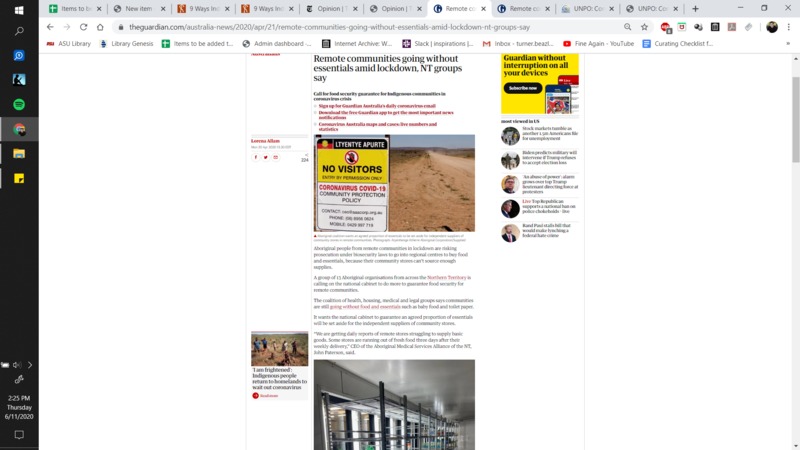
2020-04-20
“Aboriginal people from remote communities in lockdown are risking prosecution under biosecurity laws to go into regional centres to buy food and essentials, because their community stores can’t source enough supplies. A group of 13 Aboriginal organisations from across the Northern Territory is calling on the national cabinet to do more to guarantee food security for remote communities.”
-
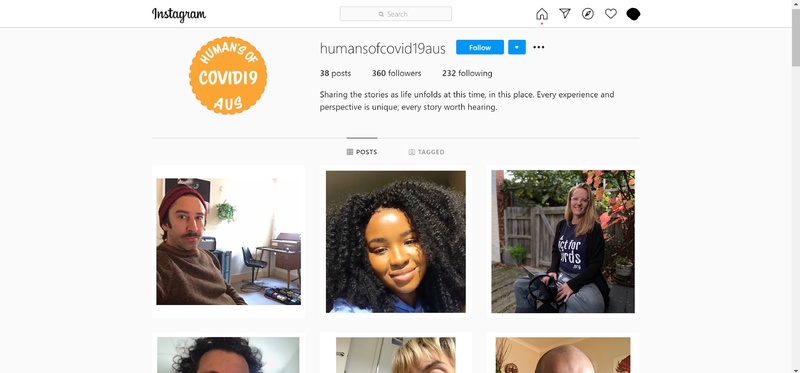
2020-04-16
I am a psychology student living in Melbourne, and I was interested to hear about how COVID19 was impacting on different peoples’ lives. So I contacted a broad range of people from different backgrounds and sectors to see how they were tracking and how their lives have been changed by the current state of the world. I then posted anecdotes of the conversation onto an instagram forum @humansofcovid19aus.
-
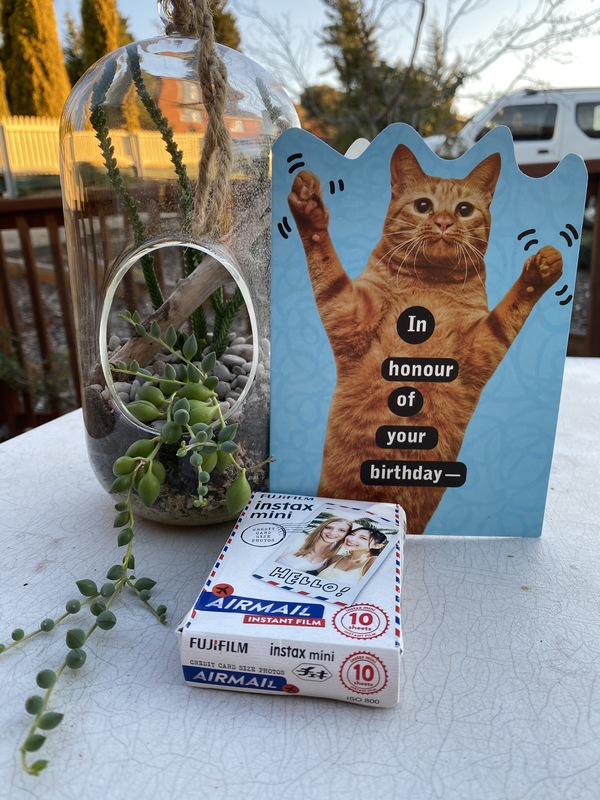
2020-03-21
My birthday fell just before the height of the pandemic. While staying at home was not yet mandatory, social distancing was starting to be brought in. Luckily, some of my amazing friends dropped off this birthday present and left it outside my door.
-
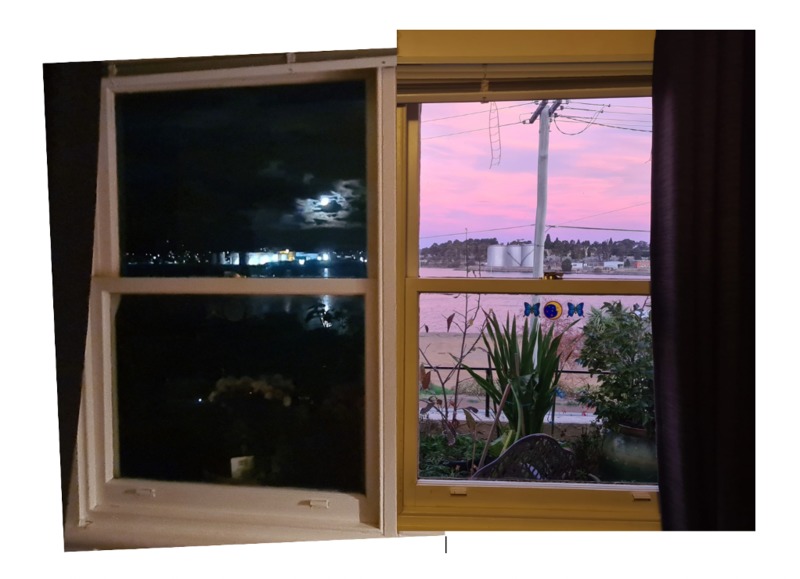
2020-05-09
I am including this selection of two photos of my bedroom window, as this has been the dominant view and my sole saving grace throughout lockdown. The photo on the left was taken in my first week of lockdown on the twenty third of March, which was the first week that I began to stay at home as I am asthmatic and was very concerned about my own health making me more vulnerable. The second photo was taken on the first of June, and marks ten weeks since my own ‘lockdown’ began, I have somewhat lost track of the various stages of lightening of restrictions as I was still mostly avoiding going out up until the point when the second photo was taken. In many ways my asthma and anxiety made this experience pretty traumatising, I stopped walking my dog because I people kept patting her and I had too much anxiety about the conflict of constantly asking people not too, and I was worried about the contact risk to myself from people touching my dog. After the rate of community transmission stabilised, I felt safer going out to places, but then I found the secondary anxiety of people behaving in rude and hostile ways towards me in public due to my obvious coughing or wheezing from asthma after I had an obvious asthma attack in Officeworks. My isolation has thus been pretty intense and long lasting compared to some others and combined with anxiety has induced an intense sensation of feeling trapped in my bedroom. The access to sunlight and fresh air through this window, as well as my beautiful view has been a literal visual lifeline, I found myself taking lots of photos of the window and my view. In many ways I feel like this has made me far more attentive than I have ever had the opportunity to be to the changes between night and day, and the slow seasonal change into winter.
-
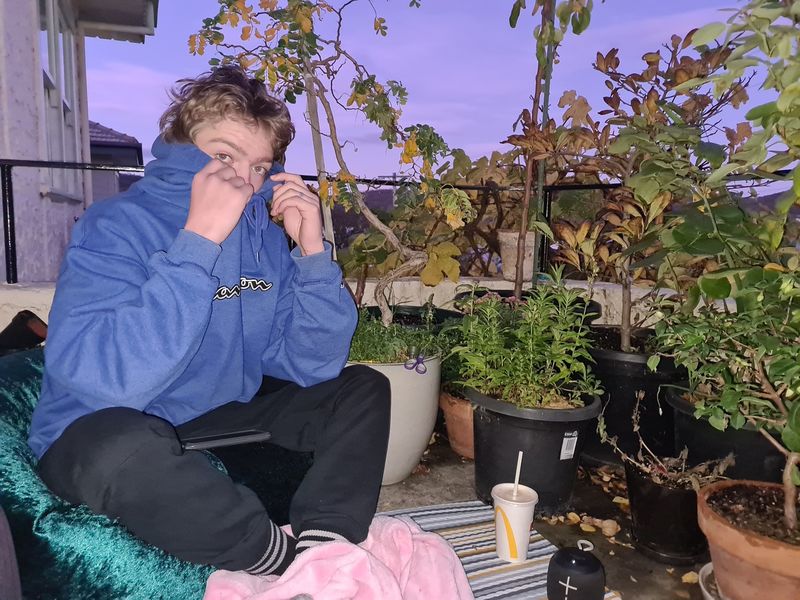
2020-04-17
This photo is of my little brother, who is sixteen this year, as we were spending time together on the balcony of our house. This was out of sheer desperation in terms of getting out of the house, even though it is freezing outside at this time of year in the afternoons. For two months during lockdown my brother and I spent more time together than we probably have in the last three years combined, given that I am ten years older than him and have lived out of home up until last year our relationship was always a bit like ships passing in the night. In addition to that our relationship has always been vaguely parental due to the age difference (and possibly my own gendered conditioning to adopt a caregiver role), yet in this period I have had such a strange feeling of emotionally revisiting my adolescence due to the amount of time I am spending with my brother and cousin who is eighteen, which has been such a strange and disorienting experience. I feel like this has been such a pointed sensation for me as someone who doesn’t drive, and with public transport it is just bearable as I have some access to independent travel. But when I could no longer go anywhere at all without my mother driving me, I felt like my identity as a capable adult essentially crumbled overnight. There are elements to this that are positive, I feel like my brother understands me much better now and my relationship with my cousin borders more on the side of best friends than cousins in a way that would probably not have happened if I hadn’t been forced to put aside the cloak of adulthood which made me essentially relate to my cousin from a caregiver perspective.
-

2020-04-22
I have included Jan Fran’s name in this only because the facebook post was public and she is an established political commentator, but I was somewhat anxious about publishing her words in this way. When I first saw this facebook post it honestly probably took me about a week to get over my sheer rage at the amount of money Jeff Bezos has personally made profiting from the pandemic, which wouldn’t be so bad if it weren’t for that fact that his personal wealth is so staggeringly incomprehensible already. I read the other day that he has pledged a billion dollars to charities in the wake of coronavirus, which is just under a third of his personal wealth. How is it that one man can accept brownie points for donating a billion dollars in a context when he can justify keeping nearly two billion dollars in personal wealth while income inequality is a driving force in the deaths of over a hundred thousand people in his own country alone. How can anyone can claim to have ‘earned’ or ‘deserve’ such a staggering amount of money in a world rocked by a global pandemic is just so incomprehensible. Jan’s point about this false trade-off between the health of the economy and safety, which is made on so many levels above and beyond public health in a pandemic (because funding free education is bad for the economy rather than billionaires) is so striking, and I can only hope there are enough people who are more disgusted with the two billion dollars Jeff Bezos decided to keep than there are wanting to pat him on the back for donating the one billion.
-
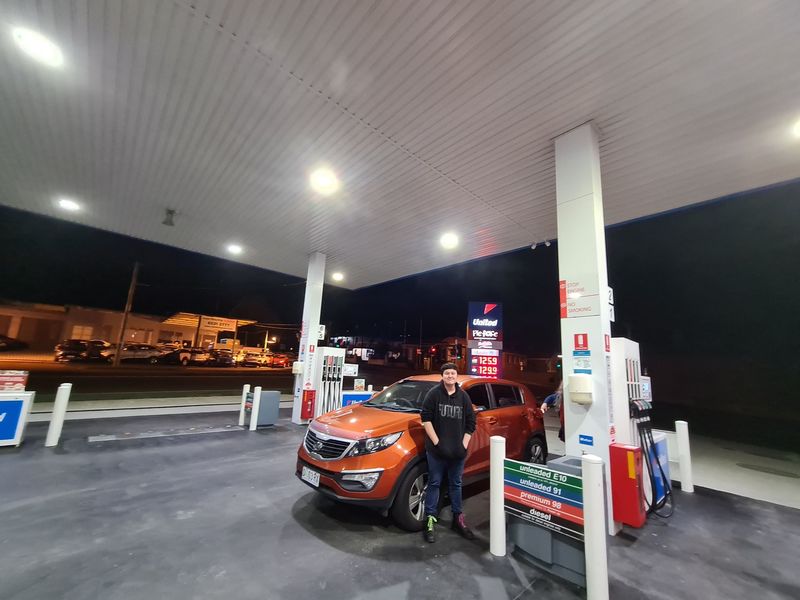
2020-04-06
I have included this photo as it reminded me so strongly, on the night I took that photo, of Edward Hopper’s Nighthawks (1942). For some reason I have always found the colour palette and story of that particular painting to be really soothing and calming, and it has always been one of my favourite painting for that reason even though by genre and artist it falls well outside my usual area of interest. I remember reading something years ago which described the scenes depicted in Hopper’s artworks in this period as depicting liminal social spaces, characterised by public spaces designed for crowds (cafes, hotels lobbies, restaurants etc.) which are nearly empty and in between phases of activity, and this whole year has felt like one giant Hopper painting that I can’t escape from. I looked at a bunch of his paintings again whilst deciding what to say about this moment, and the painting Automat (1927) is one I have always identified with in a really positive way being both rather introverted and a ritual tea drinker. When I was looking at his paintings again and saw it however, I felt such a strange rush of both sadness and anxiety and I can’t help but feel like my enjoyment of Hopper’s paintings in this period has been ruined forever, though hopefully my feelings about the paintings will swing in the opposite direction again as I age and change myself, as great art is wont to do.
-
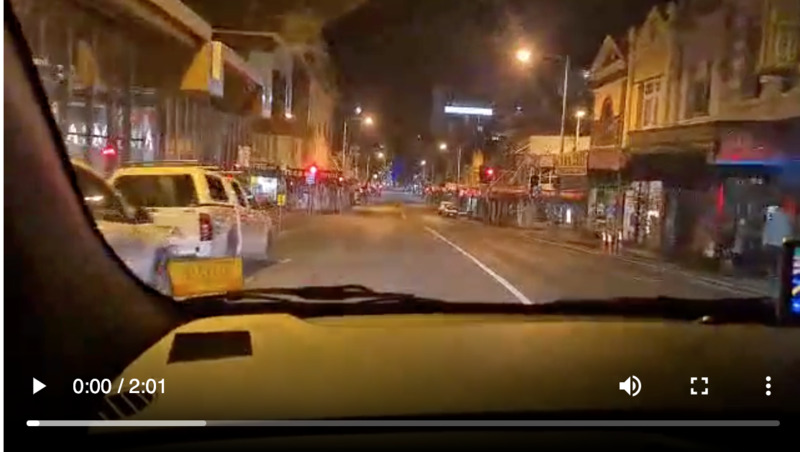
2020-04-17T19:30
I included this video because in my own time practicing social distancing and social isolation, I noticed that my days and nights became dominated by two distinctive scenes, which is a rather harsh contrast to the variety of settings available to me normally. The first being the windows to freedom I had driving in the car to and from the grocery store, or occasionally to go through the drive through. The second is my home, or more specifically the bedroom from within which I have to sleep, study, eat and entertain myself. Whilst I had access to several peripheral liminal zones between these two, such as the balcony outside my bedroom and my local walking track when walking my dog. The neon lights and empty spaces of the outside world through the car window, or through the layer of social distancing in the grocery store exemplify so much of the feeling I have experienced in isolation. I can’t quite pin down this feeling with a pithy phrase yet, but I found that the physical confinement to settings which became routine was so much more traumatising than the lack of social connection which was for me almost an over surplus rather than a lack as I am constantly surrounded by family with both my mother, brother and occasionally cousin being confined to a small cottage house. I feel like the whole world became this strange liminal space in which daily communal expectations were suspended without being overturned with new expectations, I never really got the sense of ‘the new normal’ that others have mentioned.
-
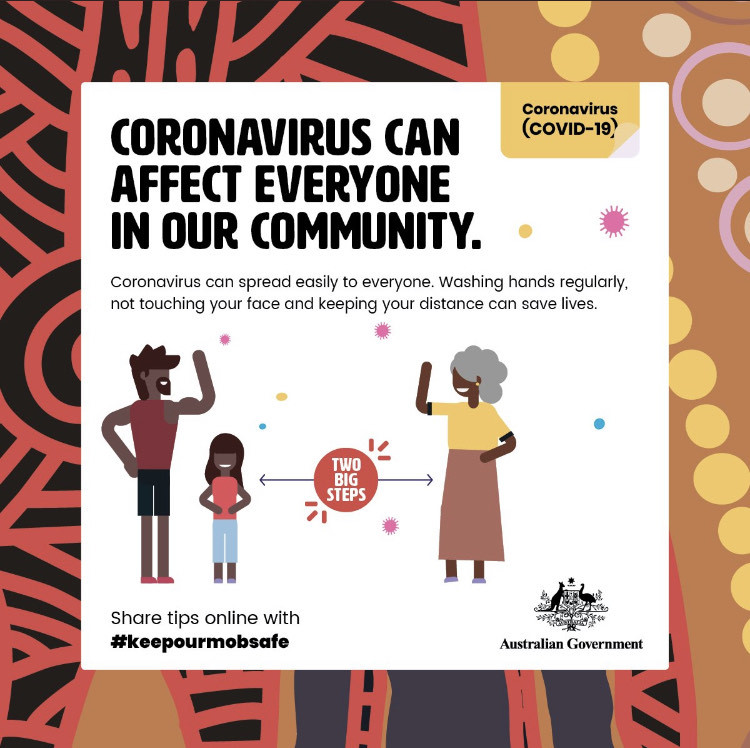
2020-05-23
HUM402
The Australian Government has launched a campaign to #keepourmobsafe. This image is of a screenshot of an ad for the campaign, which the government is using to educate Indigenous Australians regarding the risk of COVID-19. The ads appear to be targeting Indigenous Australians living in remote communities, giving them tips on how to stop the spread of COVID-19 and utilising indigenous artwork and slang to appear 'relatable'.
-
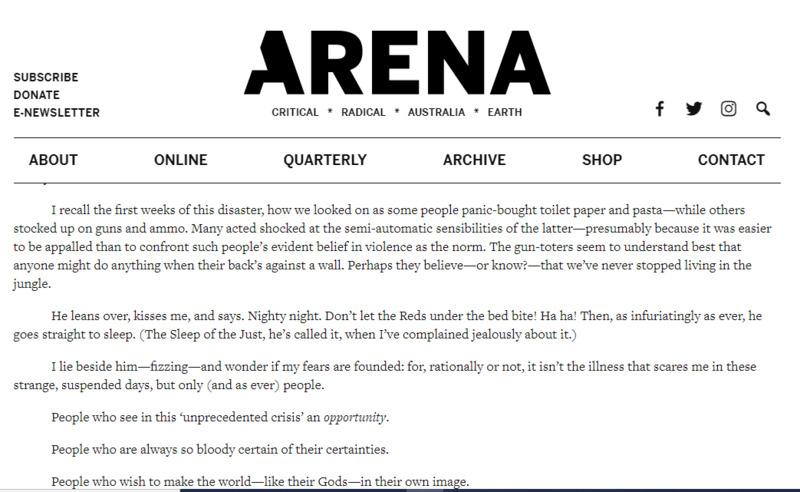
2020-06-02
This is my literary response to being relatively safe whilst watching Covid reek havoc around the world.
-
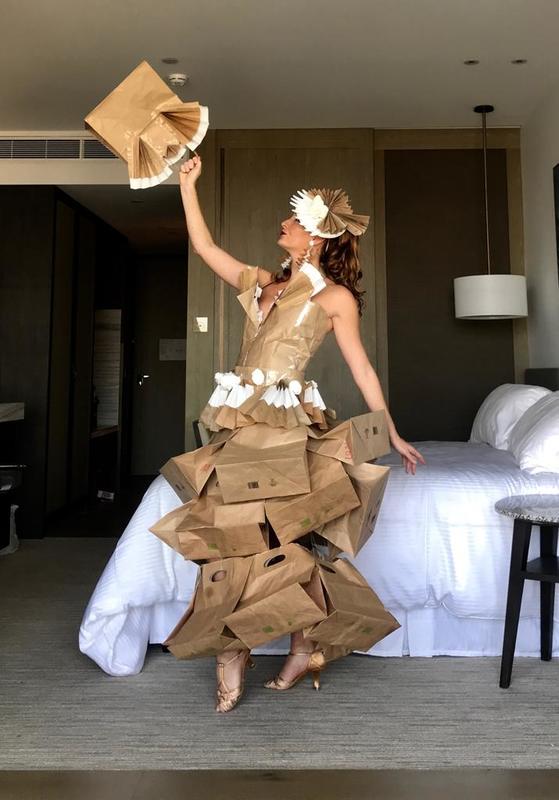
2020-05-28
I was working as a dancer on the Cruise Ship MS Zaandam when the Covid-19 Pandemic hit. Countries began to close their borders and passengers and crew began presenting with flu-like symptoms. The entire ship went into lockdown to prevent the spread of this illness which was later confirmed to be Covid-19. We were denied entry to Chile, Peru and the Panama Canal. At this time we had 4 deaths onboard. The MS Rotterdam came to our aid with medical staff, test kits and supplies. Eventually we were granted entry through the Panama Canal to disembark passengers and sick crew in Florida. The ship then left port and sailed to the Bahamas were all crew had to undergo a 14 day CDC ordered quarantine.
Repatriation plans were made and I was transferred to the Nieuw Statendam and sailed across the Atlantic to disembark in Rotterdam on May 13th. This ended up being a total of 60 days stranded at sea. After flying home to Perth I faced another 14 days away from family in mandatory Hotel Isolation . We were delivered meals 3 times a day that came in paper bags and other biodegradable containers. I wanted to do something creative and a little bit quirky to pass the time. This packaging became my inspiration to create a range of outfits constructed from these recycled materials. I posted a video of these creations and it went viral on Facebook. I have kept these costumes as memorabilia.
-
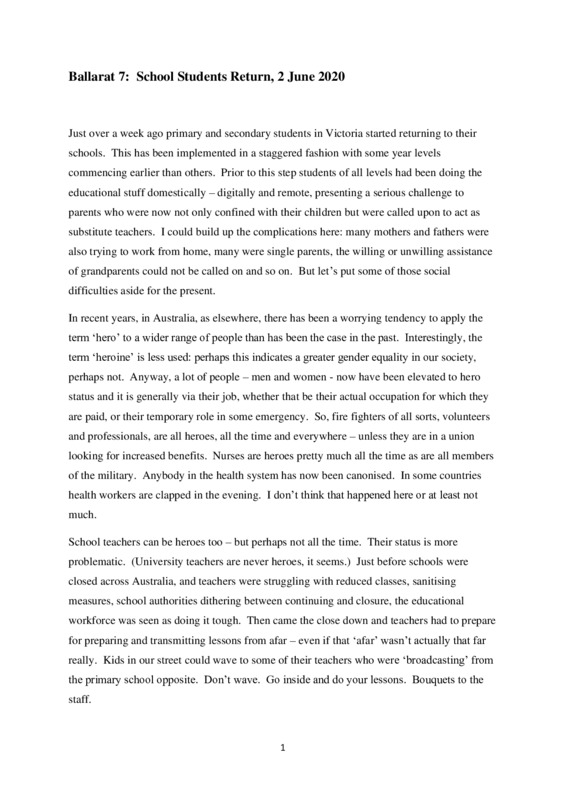
2020-06-02
I have provided hopefully some personal insights into how school teachers have been perceived while schools have been closed and recently re-opened in Victoria.
-

2020-05-29
I have written this short story around the circumstances in which we found ourselves in Ballarat, Victoria, Australia. Short story based on actual events in the current health crisis.
-
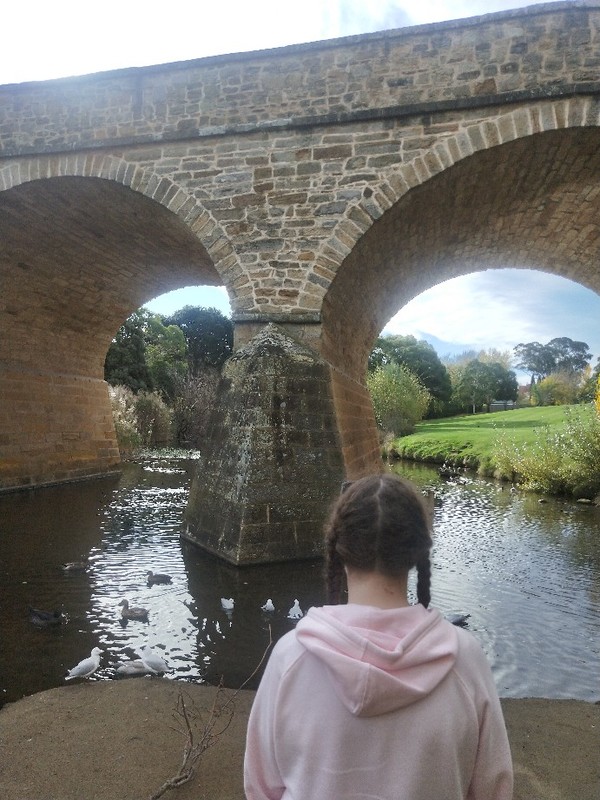
2020-05-14
This was taken on the first occasion that I left my hometown in almost two months of isolation. My partner and I went to Richmond, a town only ten minutes from my house and very familiar, but the act of leaving was peculiar after so long sequestered. The Richmond Bridge, featured in the image, is the oldest of its kind in Australia, a piece of convict heritage that has stood the test of time. Some of my earliest memories feature the bridge and its surrounds, and returning to that place at the beginning of a post-COVID-19 existence was a peculiar sensation. For me, it will now have dual historical implications, as a relic of the nineteenth century, and of the plague year.
-
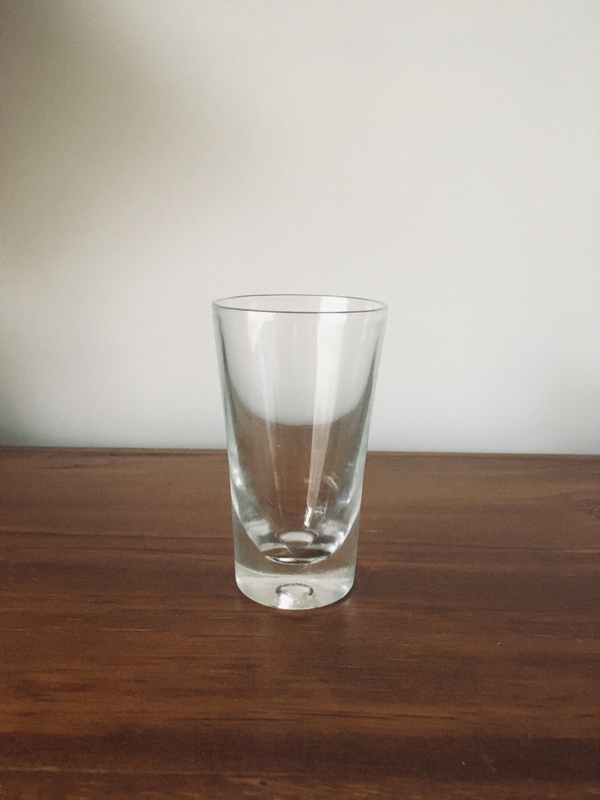
2020-05-25
The first person I visited when restrictions in Tasmania were eased the first time was a ninety-year old lady, a family friend and distant relation who knows all the stories everyone else has forgotten. I sat in her house for two and a half hours and listened to her talk about our family and all the people they knew, and I learned about a past that is rapidly disappearing as the people who remember it age. After my visit, she gave this glass to my mother. It was my great-grandfather's preferred glass at the local pub, and was gifted to this woman's husband after he died, as he was a great friend to my great-grandfather. She chose to give it to us thinking it would mean more for us than it does her.
I had intended to visit Mrs Howlett for months, but life kept getting in the way. The pandemic afforded me the opportunity to explore my own past and the history of many other people in a way that I usually can't in everyday life, and this glass is a physical, tangible example of that experience.
-
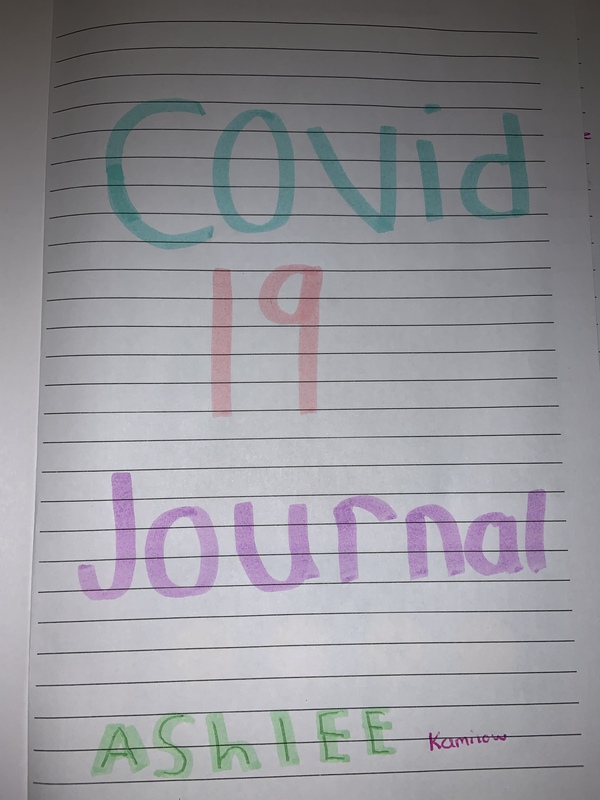
2020
This is a journal I wrote my self for a school assignment to recount what it was like living through the COVID 19 crisis
-
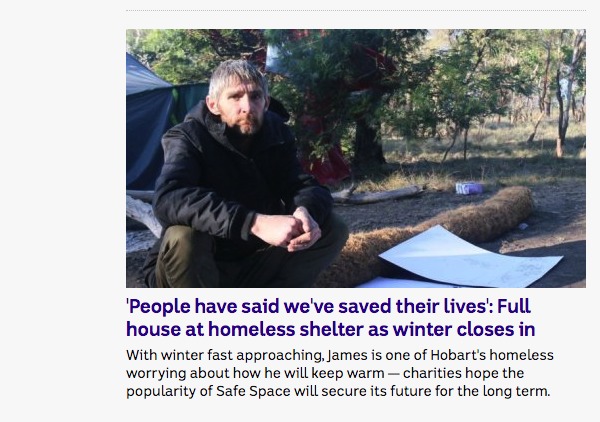
2020-05-26
As Tasmanians, saturated in the flood of online media content, look on at the state of the world, feelings range from extreme anxiety, compassion with those in crisis centres, to smug repose (“at least we are not in that country”). This last response seems particularly rife today, but it struggles to conceal an inherent coldness which we don’t otherwise normally like to attribute to ourselves. Not only does this attitude overlook that fact that we have our own dead, or that the cost of life is of a value that far outpaces numerical value (comparing our figures with death-tolls in other places), we ignore those without home in the very place in which all of us are meant to dwell together.
Prior to the lockdown, Tasmania’s capital city Hobart underwent a housing crisis. But as we wait on Canberra to get things moving along - exactly as they were before or, even better than before - we should keep in mind that not everything is possible just because money is behind it. To return to the housing crisis: this challenges all of us to think about our responsibility towards those forgotten in our own home. Genuine responsibility begins with compassion, not money. I feel like, too often, we reverse the formula.
-
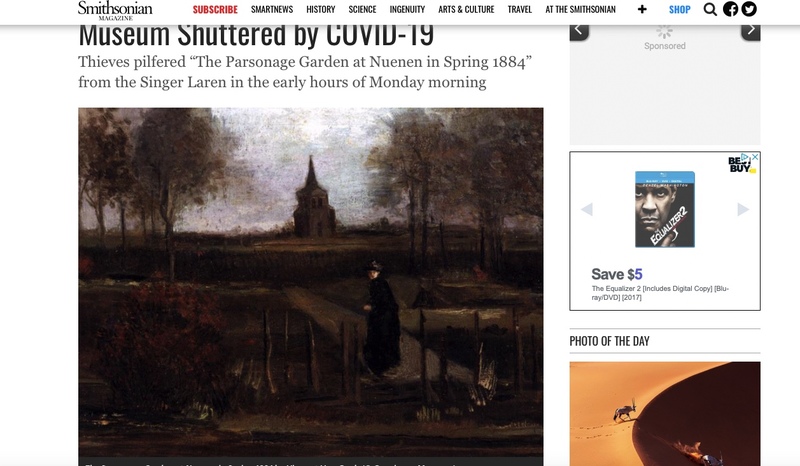
2020-03-30
A Van Gogh painting was stolen from a museum in the Netherlands due to closure because of COVID-19.
-
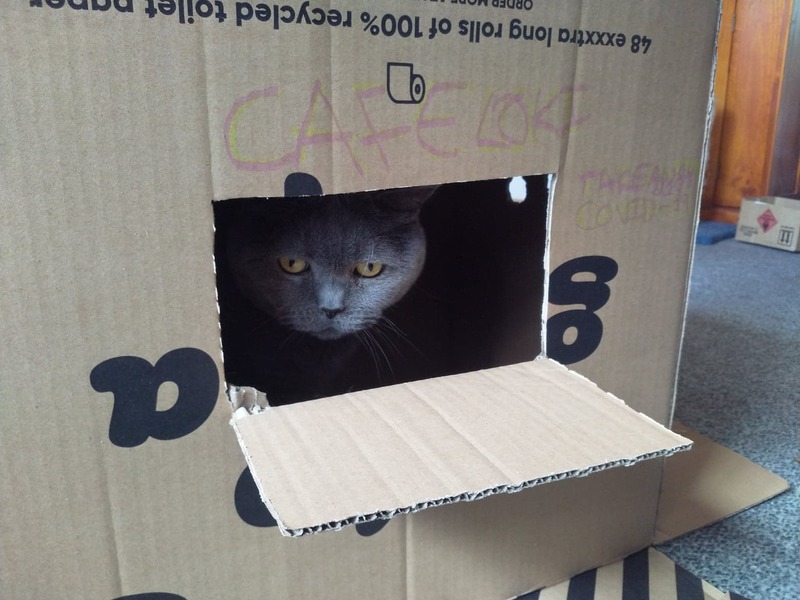
2020-05-27
My girlfriend was housesitting for a man who was unfortunately on a cruiseship when coronavirus hit, and he had to be quarantined on Rottnest island. This box was ironically holding toilet paper, but we repurposed it to be a cat café and wrote that he was only serving us takeaway due to COVID-19 restrictions.
-
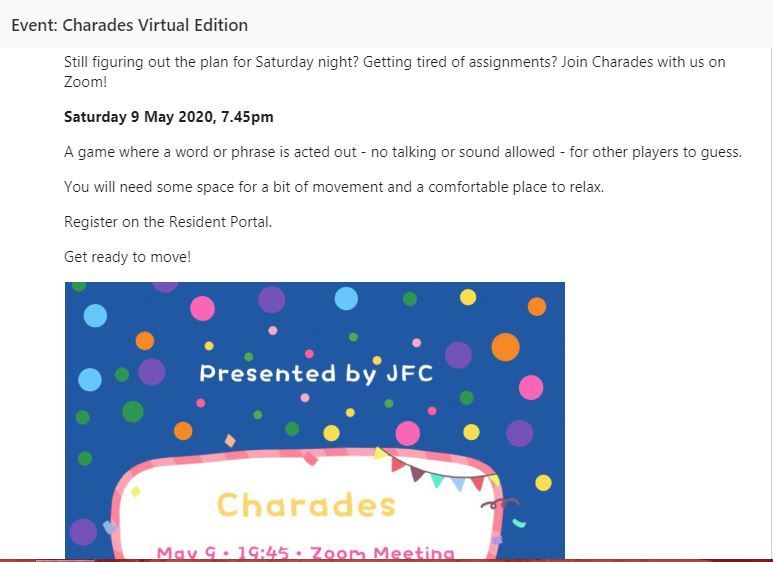
2020-05-27
Over the course of the pandemic student resident committees and the student living staff at the UTAS Sandy Bay Student Accommodation have come up with many online activities to keep residents connected with each other. This example is an invitation from the John Fisher College resident committee.
-
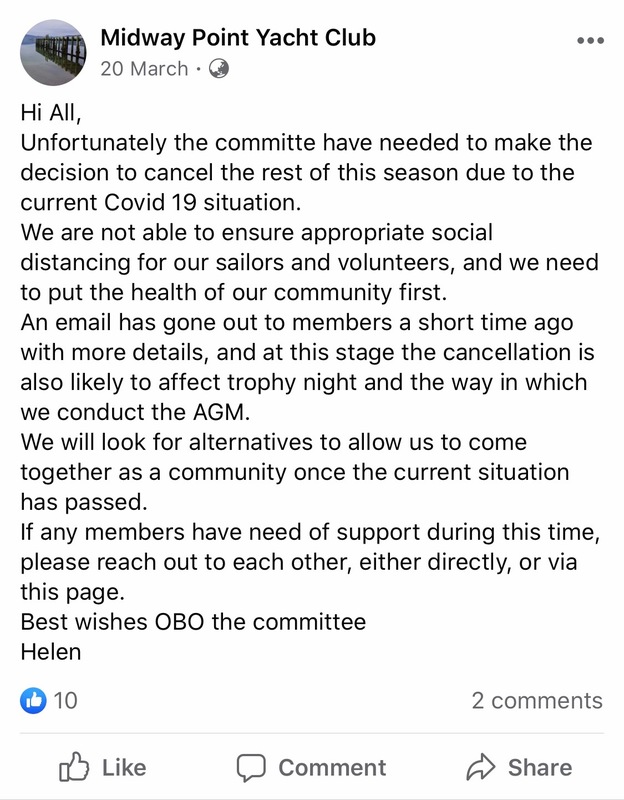
2020-03-20
Sailing, as well as all other sports, have been cancelled or postponed due to the Covid-19 crisis. This sailing club, like many others is therefore shut for the foreseeable future. I chose this image because through all the years that I have been sailing (17 years) nothing like this has ever occurred before.
-
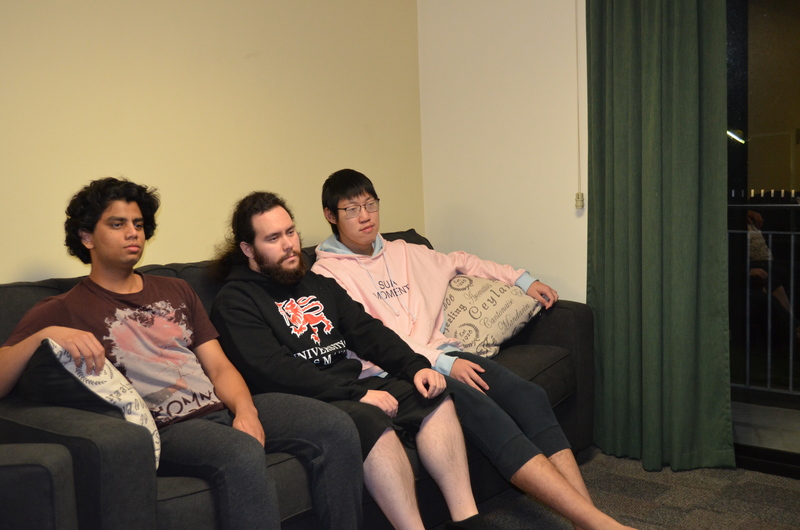
2020-05-27
I have spent the pandemic living with my 5 flatmates in our student accommodation. Some of us had lived at student accommodation before and were already acquainted with each other, whereas others were strangers at the beginning of the year. Over the last few months we have learned to live with each other amidst the uncertainty posed by the virus, organising cleaning rosters, discussing food, stressing over university assignments and rediscovering the beauty of The Lord of the Rings films.
-
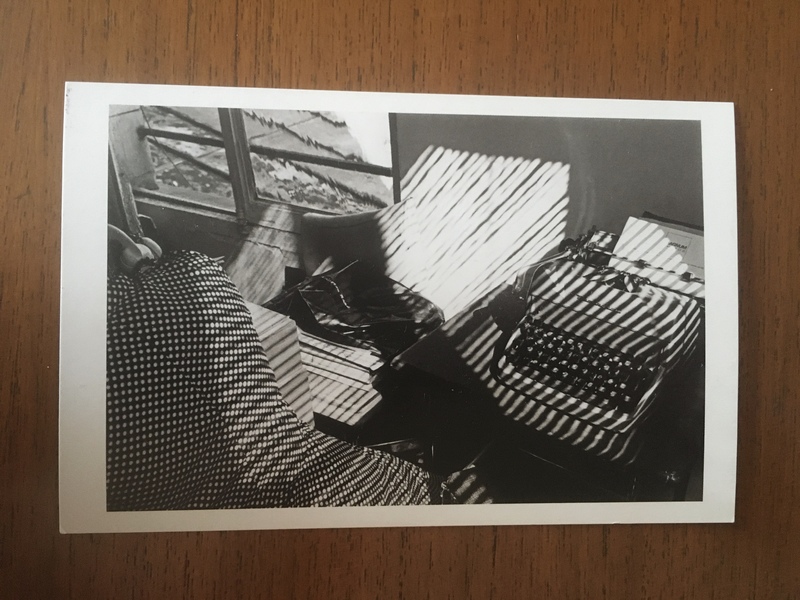
2020-04-27
Sent to me by a friend who lives less than half an hour from me, this is an example of how the world has reverted in some ways during the pandemic. Written letters and postcards are largely objects of the past, yet this was an effort at analog connection in the digital world, one that required thought and care to produce.
-
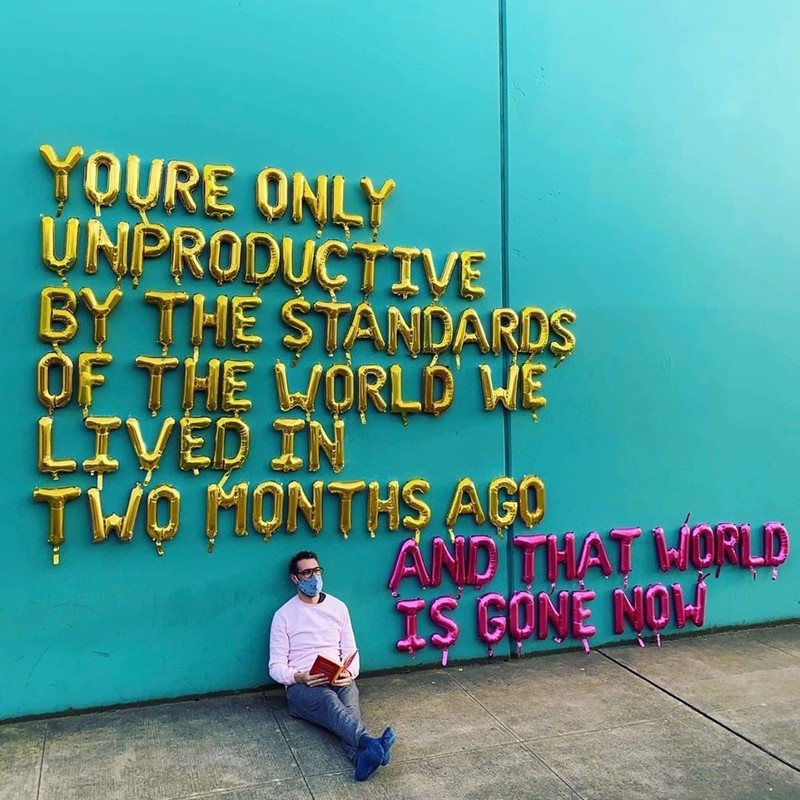
2020-04-30
This image, found on Instragam, encapsulates the immediate effects of COVID - 19 upon the way individuals live their lives. By exploring the juxtaposition between the before, during and after states of COVID - 19 the post articulates the changing dynamics of the world around this virus.
-
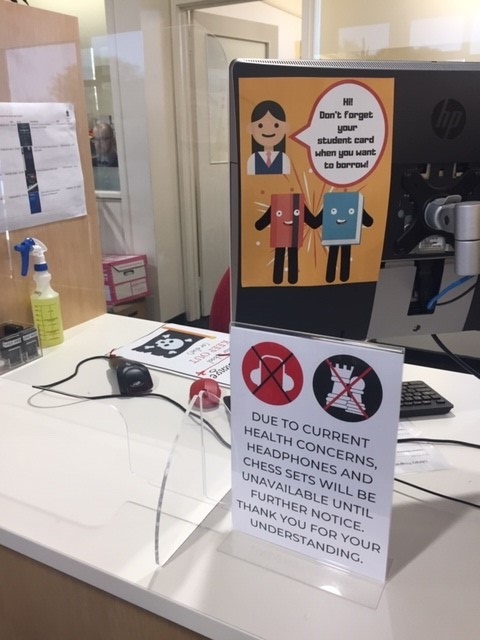
2020-05-26
Mentone Girls' Grammar School Kerferd Library information desk during the COVID-19 return to campus (Phase 1) 26 May 2020. For student and staff safety the library stopped lending headphones and chess sets. In phase 1 junior school students in Prep to year 2, as well as senior school students in years 10, 11 and 12, returned to campus. Students in years 3 to 9 remained off campus and continued with online learning until phase 2 which commenced on 9 June 2020.
-
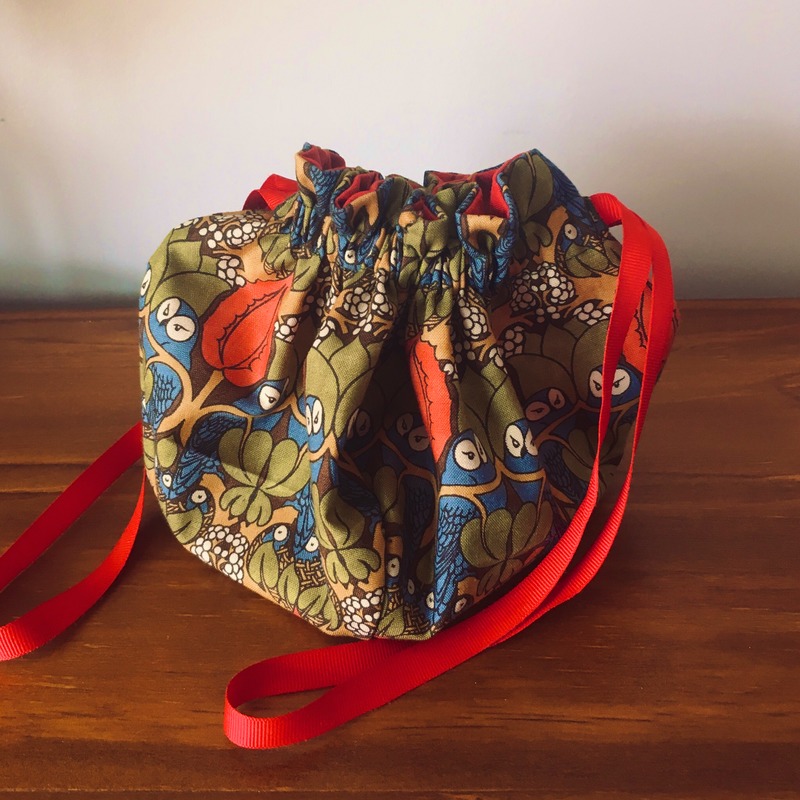
2020-03-30
This was the first thing I made during the pandemic. It provided an outlet for my excess energy at the beginning of the initial isolation period, but also allowed some community engagement as it was part of the Instagram movement in the sewing community, #sewcialdistancing. It provided an avenue for me to connect with other creators, and refocus myself at the beginning of isolation.
-
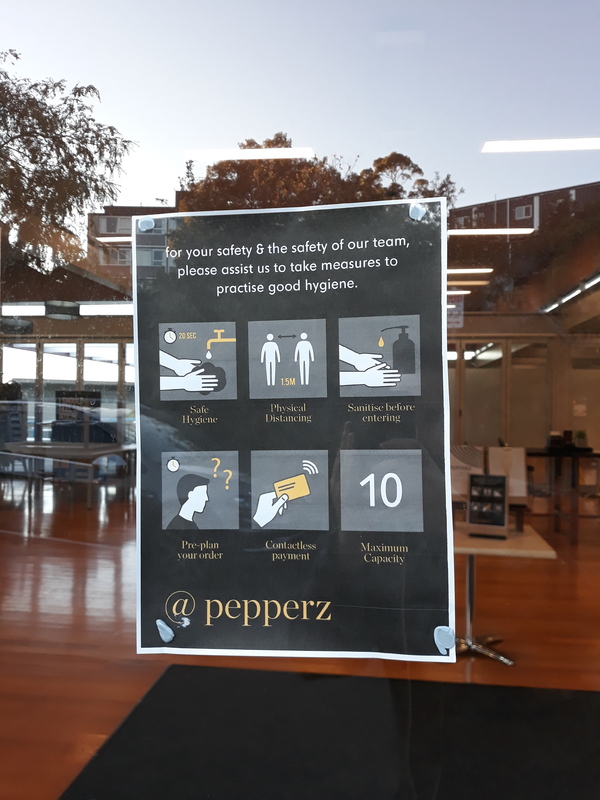
2020-05-26
A safety poster on the window of Pepperz, the restaurant of the UTAS College Road student accommodation. Pepperz became a vital source of cheap cooked meals for many residents who relied on communal kitchens prior to the lock down. Access to those kitchens was restricted due to social distancing measures.
-
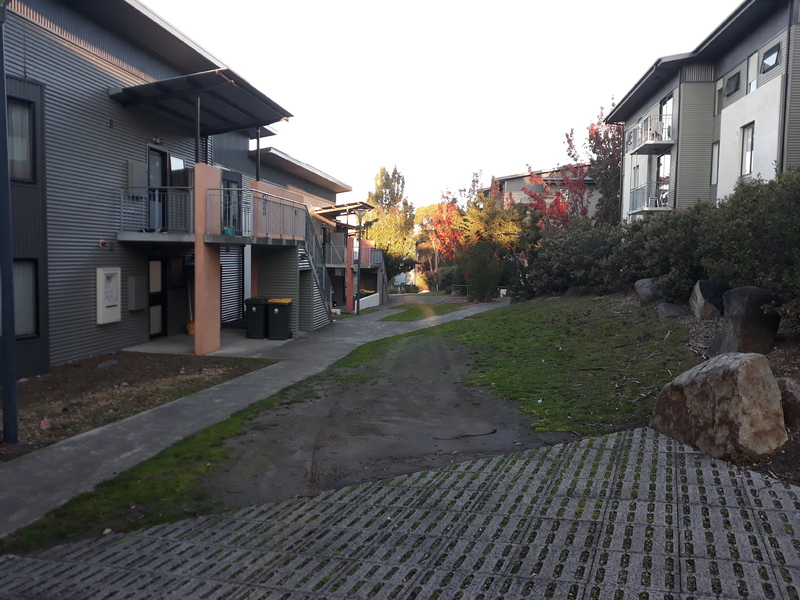
05/26/2020
One section of the UTAS student accommodation on College Road, Sandy Bay. Here reside several hundred university students from across Tasmania, Australia and the world. At the beginning of the year residents would gather at social events, making new friends and reconnecting with old ones. But when the pandemic reached Tasmania the mood grew tense and students withdrew into their accommodation.
-
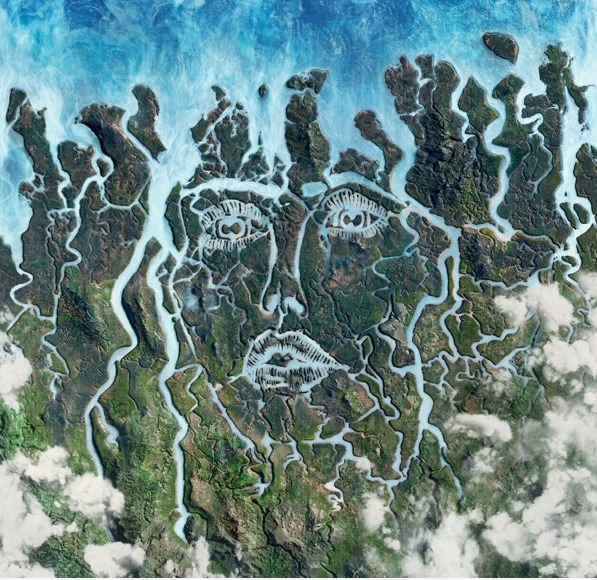
2020-05-26
My favourite UK electronic band, Disclosure, released a new single from their forthcoming album "Energy" during lockdown. The track, also called "Energy" is a work of house/electronic music art that reflects the times we are currently facing. It's uplifting, direct, exotic, punchy and a lot of fun to listen to.
-
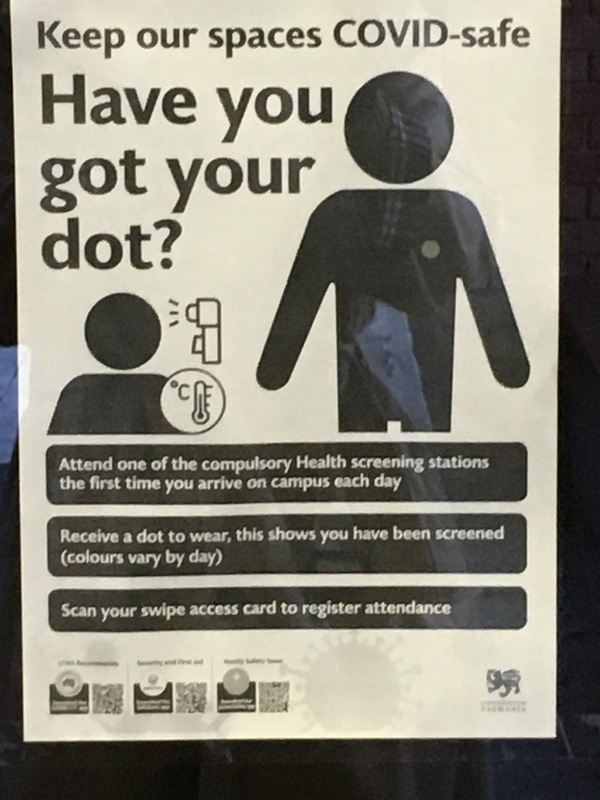
2020-05-26
After Tasmanian restrictions were eased for the first time on Monday 18 May, these signs started to appear around the University of Tasmania's Sandy Bay campus. They show the university's response to allowing a limited number of people on campus daily and the safety procedure of having a temperature check and wearing a sticker to confirm that each person on campus is well.
-
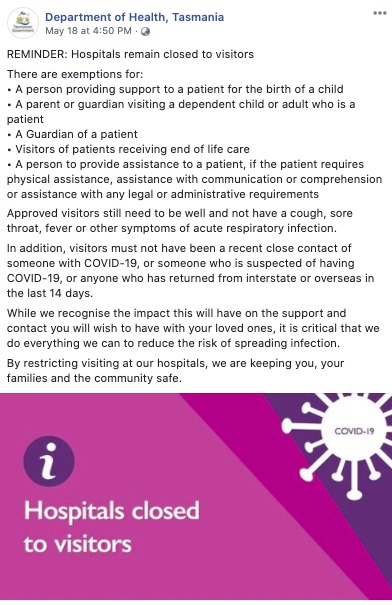
05/18/2020
While some restrictions have begun to gradually ease in Tasmania, hospitals remain closed to visitors in order to keep staff and patients safe from the spread of COVID-19.
-
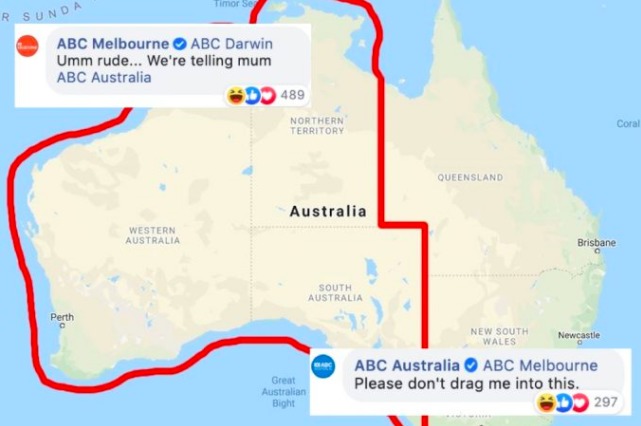
05/12/2020
HUM402
Last week ABC Darwin asked on Facebook: "How do you feel about a travel bubble for the NT, Western Australia and South Australia?" Unexpectedly, the ABC pages for the various Australian states responded and the comments erupted into a hilarious "fight" between them all.
-
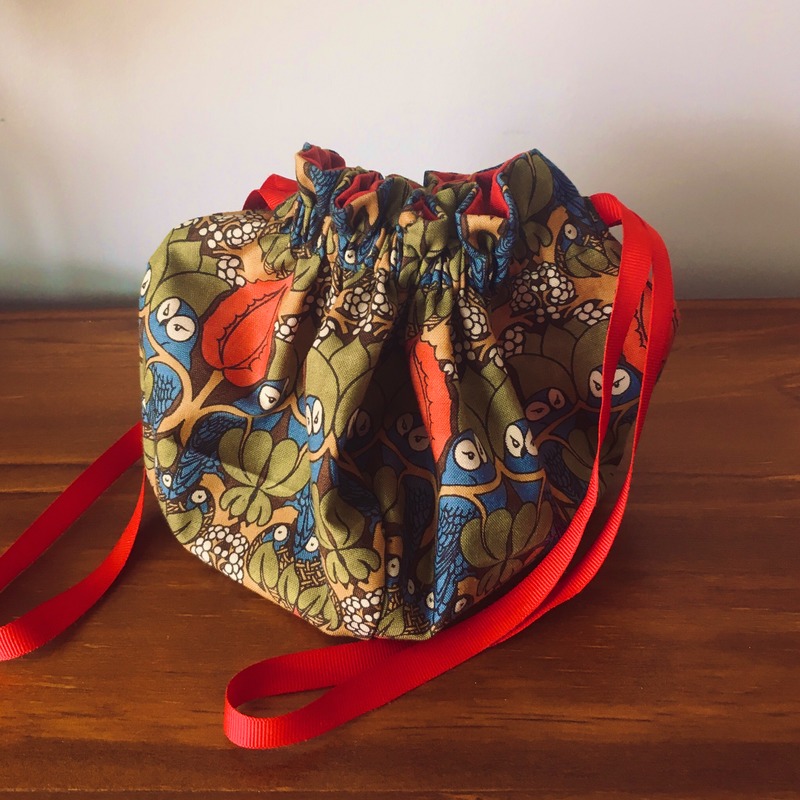
26/05/20
This item was the first thing I created once entering isolation. A project that I have been putting off for several months, it created an outlet for me to channel the initial nervous energy of the isolation situation. In this I contributed to a larger trend on Instagram in the sewing community, #sewcialdistancing, in which cosplayers, embroiderers, historical costumers, and other sewers began channeling their own excess energy into projects.
-
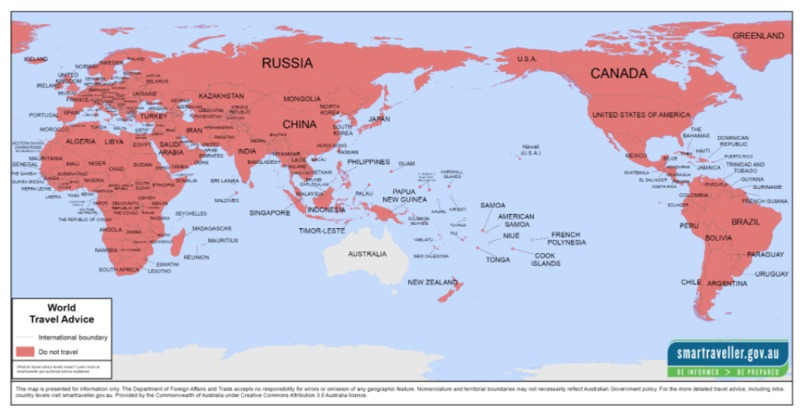
04/08/2020
SmartTraveller is the Australian Government's travel advisory website. This may be a historical first: every continent on the SmartTraveller map is red. The government's official advice is 'Do Not Travel' for everywhere in the world. It's a striking visual that sums up the universality of the pandemic experience.
 2020-04-17
2020-04-17 2020-04-16
2020-04-16 2020-04-16
2020-04-16 2020-04-16
2020-04-16 2020-04-16
2020-04-16 2020-04-16
2020-04-16 2020-04-16
2020-04-16 0020-06-01T07:00:00
0020-06-01T07:00:00 2020-06-19
2020-06-19 2020-04-16
2020-04-16 2020-04-16
2020-04-16 2020-04-16
2020-04-16 2020-04-16
2020-04-16 2020-04-16
2020-04-16 2020-03-23
2020-03-23 2020-05
2020-05 2020-04-20
2020-04-20 2020-04-16
2020-04-16 2020-03-21
2020-03-21 2020-05-09
2020-05-09 2020-04-17
2020-04-17 2020-04-22
2020-04-22 2020-04-06
2020-04-06 2020-04-17T19:30
2020-04-17T19:30 2020-05-23
2020-05-23 2020-06-02
2020-06-02 2020-05-28
2020-05-28 2020-06-02
2020-06-02 2020-05-29
2020-05-29 2020-05-14
2020-05-14 2020-05-25
2020-05-25 2020
2020 2020-05-26
2020-05-26 2020-03-30
2020-03-30 2020-05-27
2020-05-27 2020-05-27
2020-05-27 2020-03-20
2020-03-20 2020-05-27
2020-05-27 2020-04-27
2020-04-27 2020-04-30
2020-04-30 2020-05-26
2020-05-26 2020-03-30
2020-03-30 2020-05-26
2020-05-26 05/26/2020
05/26/2020 2020-05-26
2020-05-26 2020-05-26
2020-05-26 05/18/2020
05/18/2020 05/12/2020
05/12/2020 26/05/20
26/05/20 04/08/2020
04/08/2020